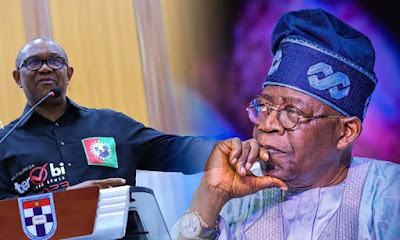On Friday, Mr. Peter Obi, the Labour Party (LP) candidate, who had accused President Bola Tinubu of the ruling All Progressives Congress (APC) of benefiting from a rigged presidential election held on February 25, concluded his case before the Presidential Election Petition Court (PEPC) in Abuja. Despite finishing in third place in the presidential contest, Obi presented numerous documentary pieces of evidence and called a total of 13 witnesses to testify.
The evidence submitted to the court by Obi included polling unit results from all 36 states of the federation and the Federal Capital Territory (FCT), Abuja. Additionally, a bundle of documents containing the total number of Permanent Voters Cards (PVCs) collected in 32 states prior to the 2023 general elections was also tendered. In support of their claims, Obi and his party presented four video exhibits, one of which featured a press conference where the Chairman of the Independent National Electoral Commission (INEC), Prof. Mahmoud Yakubu, guaranteed the real-time electronic transmission of election results to the IReV portal using the Bimodal Voter Accreditation System (BVAS) machines. Furthermore, they provided a bundle of documents that disclosed the total number of registered voters in each state.
The court accepted additional electoral documents as evidence, which included certified true copies of INEC Forms EC40Gs, EC40G1, and EC40GPU. These forms were reports from various polling units where elections did not take place.
All the Respondents raised objections to the admissibility of these documents, stating that they would provide reasons for their objections in their final written address.
Initially, the Petitioners had indicated their intention to call 50 witnesses to testify. However, they concluded their case on Friday with the testimony of the 13th witness.
One of the earlier witnesses, Mr. Tanko Yunusa, who served as the Chief Spokesman of the Labour Party Presidential Election Council and National Director of Media, testified. During his cross-examination by INEC's counsel, Mr. Kemi Pinhero, SAN, Yunusa mentioned that he voted in the Dawaki district of Abuja during the presidential poll. He also stated that he visited the LP's Election Situation Room at Asokoro before returning to his polling unit to observe the vote counting process.
Yunusa informed the court that his party had filed multiple lawsuits before the general elections and presented a copy of a judgment from the Federal High Court in Abuja, marked as FHC/ABJ/CS/1454/2022, delivered on January 23, 2023.
Exhibit S1, a certified true copy of the judgment in the case filed by the LP against INEC before the general elections, was admitted as evidence. During the court proceedings, the witness was asked to read a section from page two of the judgment. In that section, the LP had included a relief seeking to compel INEC to electronically transmit the results of the general elections.
However, the judgment concluded by refusing all the reliefs sought by the party, stating that the Electoral Act did not specify how INEC should transmit election results. The high court dismissed the suit and affirmed that INEC had the discretion to determine the method of transmitting election results.
When the witness was presented with copies of some results from the presidential election and asked to read the scores recorded for both the LP and APC, he stated that the documents were unclear and heavily damaged.
Furthermore, the witness clarified that his 105-paragraph affidavit, submitted in support of the petition, did not include any specific figures regarding the number of unlawful votes credited to President Tinubu and the APC.
Mr. Yunusa also informed the court that despite there being 176,974 polling units in the country, his party deployed a total of 133,000 agents to monitor the elections.




